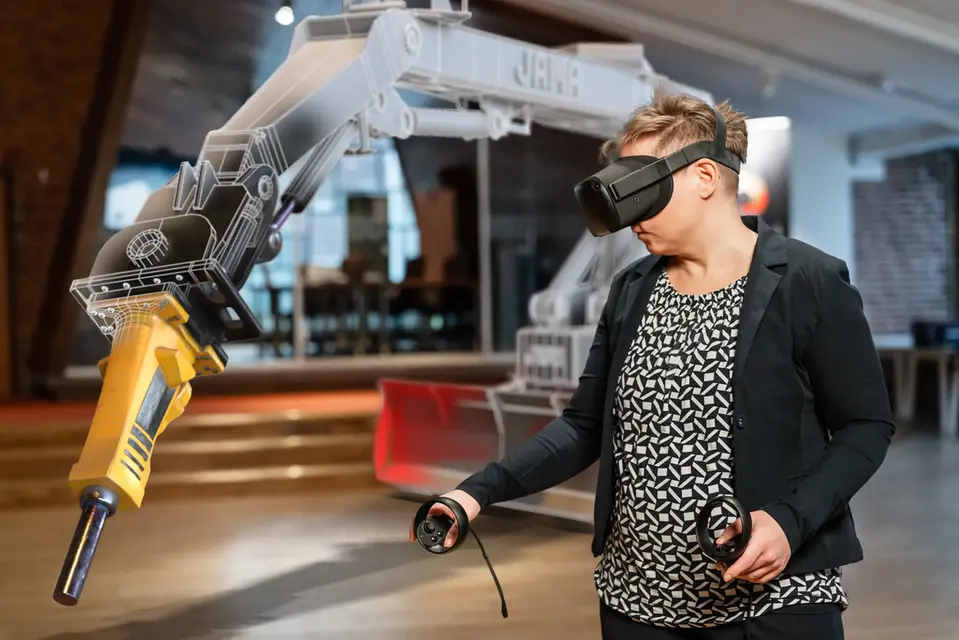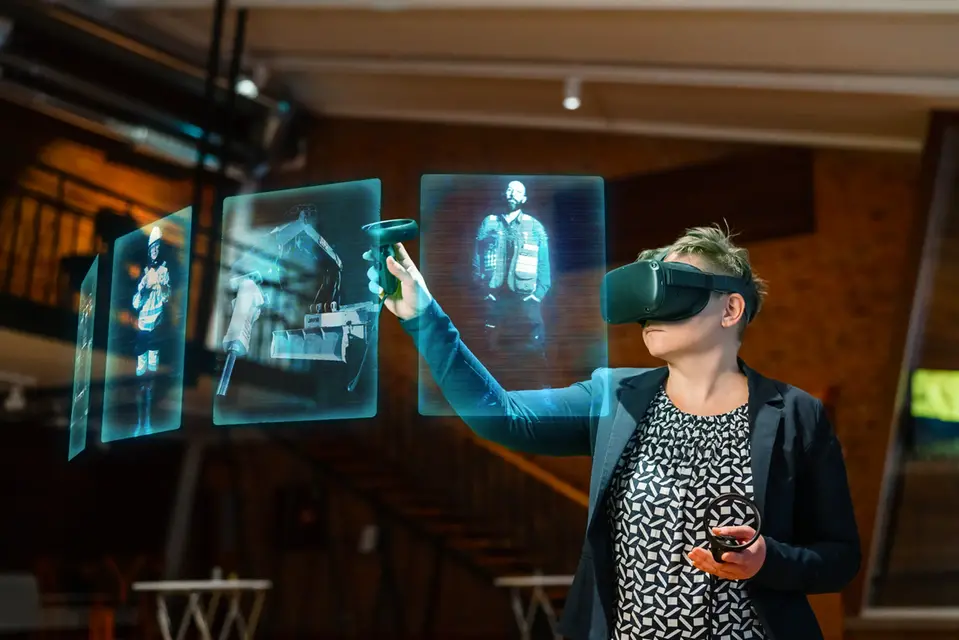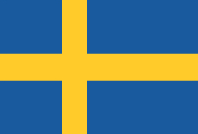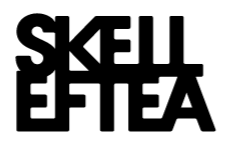DIGITAL INDUSTRIES
Skellefteå - the place where digital industries thrive
In the 1980s, Skellefteå was one of the very first municipalities to invest in a supercomputer. A pointer that has had an impact, as Skellefteå is now a place where digital and creative industries thrive.
- Here you will find all the conditions for the digital sector - good support, short decision-making paths, up-to-date education on campus and great coworking spaces, says Lara Gavina, senior strategist at North Kingdom.
North Kingdom is a creative digital agency founded in Skellefteå in 2003. The company has celebrated great international success over the years, in 2016 and 2017 for example the company won the prestigious Red Dot Award in the Communications Design category.
- We make everything from websites and digital products and services to films, apps and virtual reality experiences," says Lara.
Google, Disney, Netflix, Lego and Adidas are a selection of North Kingdoms clients. The company also has an office in Stockholm, but working with global giants from the Skellefteå office is no stranger.
- We don't have to be in the same place as the client and during the pandemic all our meetings have been digital. Under normal circumstances, we tend to bring clients in for workshops and offer them unique experiences like ice racing and snowmobile rides and let them enjoy the midnight sun. It's very much appreciated," says Lara, who also thinks the location has a positive impact on the company culture.
- Everyone who works here enjoys the outdoors and it creates a good culture," says Lara.
Campus important
As in many other industries, North Kingdom sometimes sees a challenge in finding the right skills. It places great value on the growing range of courses in gaming and IT available at Campus Skellefteå, and good partnerships increase the chances of students staying.
- They are important for the digital sector in Skellefteå, says Lara.
She notes that a lot has happened in Skellefteå in recent years and that she is meeting more and more nationalities who have moved here.
- I remember my first time in Skellefteå. When I spoke English with my colleagues during a restaurant visit, other people would react and think it was special. It's not like that anymore and it feels good to be able to relate to other people who haven't grown up here either," says Lara, who herself comes from Italy.
The cranes are now an integral part of Skellefteå's urban silhouette, a clear sign of the place's ongoing expansion. And Lara is positive about the future of Skellefteå.
- It's a place where technological experiments are being piloted, for example in spatial computing, artificial intelligence (AI) and innovative digital experiences," she says.
Wind in the sails for Nuiteq
On the campus we find Nuiteq, a software company that since 2007 has been creating solutions that make it easier for groups, schools and businesses to collaborate.
- We develop tools for people to collaborate online. They are similar to services such as Zoom and Skype, but have features that allow users to work together on documents and files," says founder and CEO Harry van der Veen.
In three years, the company has grown from 20 to 43 employees who, in addition to its headquarters in Skellefteå, have offices in India, Brazil, the United States, Canada, the Dominican Republic, Puerto Rico and Germany.
- Our different cultures and backgrounds broaden our view of things and that is a competitive advantage that I value highly," says Harry, who himself moved from Holland to Skellefteå 14 years ago.
Nuiteq sells to customers in more than 70 countries, with the largest exports going to the United States. Many customers are also in the UK and Asia.
- Sales have gone up every year except 2020 and now we want to take new steps, says Harry, who sees great opportunities for sales development at home as well.
- There are many companies working in the digital world and many who can use our product. Skellefteå is at the forefront of technology and innovation, so the future looks bright.
He is excited about everything that is happening in Skellefteå right now.
- Sara Kulturhus and Northvolt's battery factory are being built, as are new apartment blocks and office buildings. It's also positive with all the new courses being offered here on the Campus area. There's been an incredible amount happening in recent years and the expansion the site is undergoing is incredibly exciting," says Harry.
The gaming industry is expanding
Arctic Game Lab is a cluster working to strengthen the gaming industry in northern Sweden. The initiative started in Skellefteå in 2016 and today Luleå, Piteå, Boden and Umeå are also on board.
- These five municipalities have realised that the gaming industry is important to invest in and that together we can make a bigger impact," says Therese Mossberg, Communications Manager at Arctic Game Lab.
Gameification, i.e. the use of game elements in activities that are not traditionally associated with gaming, is something that is finding its way into more and more industries. For example, in healthcare, Skellefteå-based Mindforce Game Lab develops digital games that help patients with various illnesses follow their prescribed treatment and thereby improve their health.
- Games have many uses and there are great opportunities for cross-fertilisation between the games industry and other industries," says Therese.
In 2015, there were six gaming companies in Norr- och Västerbotten, a figure that has grown exponentially.
- Today there are more than 70 in our region, which has created hundreds of new jobs. A fantastic development, says Therese.
Arctic Game Lab works with business development and through the EU project Innovation Game 2.0 wants to create an attractive and inclusive gaming industry that contributes to a more diversified labour market in the region.
- To have such a strong project behind us is important. It is, together with the Nordsken meeting place and all the game education programmes at Campus Skellefteå, an incredibly important part of building our game region," says Therese.
In 2020, four new YH programmes in gaming started and in 2021, three more. They complement the game development programmes that Luleå University of Technology already offers in Skellefteå. The growing games industry in Skellefteå has had difficulty recruiting, and this is where the courses make a big difference. Both for already existing local companies, but also for companies that are thinking of establishing themselves in the region.
- Lots of new people come here to train in gaming and our hope is that they will stay and be picked up by the gaming industry in our region. The proximity to new talent means a lot. The training courses are developed in close cooperation with the gaming industry, which means that companies get the skills they need," says Therese.

Increased demand for XR
Tarvalley is one of the newer stars in Skellefteå's digital sky and was founded in 2015. The company transforms communication needs into virtual, augmented and mixed realities. XR stands for Extended Reality, and is the collective name for Augmented Reality (AR), Virtual Reality (VR) and Mixed Reality (MR).
- Today, we do almost exclusively XR projects. We believe in experience-based products, which make a bigger impact and are more fun for the user than traditional methods," says Niclas Lundmark, operations manager and creative director at Tarvalley, and continues:
- The global XR market is growing very fast and these services will continue to be in increasing demand. The need has increased during the Corona pandemic.
- When we can't be seen, the need to find alternatives that match reality as closely as possible increases, and XR is an enabler here. For example, in the growing e-commerce sector, where competition is high, more companies are turning to XR. This could be AR solutions that allow you to try on different shoes or garments from the comfort of your home via your mobile phone. Or in industries where AR is used to help with maintenance remotely," says Niclas.
He concludes that XR will change the way we work and learn, and how we consume and experience things.
- If we look at XR in learning, experiential learning stays in the memory much longer compared to traditional passive learning. In VR, you can also practice dealing with dangerous or complicated situations that would be difficult and costly to do in real life," Niclas says, citing the mining and metals company Boliden as an example.

Sidinformation
- Senast uppdaterad:
- 2 March 2023

